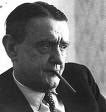Georges Auric 1899 – 1983
June 22, 2009
 Georges
Auric 1899 – 1983 was a
French composer.
Georges
Auric 1899 – 1983 was a
French composer.
Georges Auric was a patient of Elizabeth Wright Hubbard, and he was a member of Les Six, and a colleague of homeopathic supporters Arthur Honegger, Radley Metzger, Darius Milhaud, Eric Alfred Leslie Satie,
He studied at the Paris Conservatoire, and under the composer Vincent D’Indy at the Schola Cantorum. Before he turned 20 he had orchestrated and written incidental music for several ballets and stage productions.
As a young student of at the Paris Conservatory in 1920, and, considered avant garde, Auric became part of Eric Alfred Leslie Satie and Jean Cocteau’s famous group, Les Six. His participation led to writing settings of poetry and other texts as songs and musicals. During this time, he wrote his one act opera Sous le masque (1927). (An earlier opera, La Reine de coeur (1919), is lost.) It was also in 1927 that he contributed the Rondeau for the children’s ballet L’Éventail de Jeanne, a collaboration between ten French composers.
When Jean Cocteau started making motion pictures, at the beginning of the 1930s Auric began writing film scores. He wrote soundtracks for a number of French and British films, and his success led to writing the music for Hollywood movies, too. Several times, Auric’s work made it onto the hit parade, notably The Song from Moulin Rouge.
Especially notable among his film music is the lavishly impressionistic score that he wrote for Jean Cocteau’s Beauty and the Beast (1946); other films include Passport To Pimlico (1948), The Lavender Hill Mob (1951), Moulin Rouge (1952), The Titfield Thunderbolt (1953), Roman Holiday (1953), Le Salaire de la Peur (1953), Lola Montes (1955), Rififi (1956), Notre Dame de Paris (1956), Bonjour Tristesse (1958), The Night Heaven Fell (1958), Goodbye Again (1961), and Therese and Isabelle (1968).
In 1962 he gave up writing for motion pictures when he became director of the Opéra National de Paris and then chairman of SACEM, the French Performing Rights Society. Auric continued to write classical chamber music, especially for winds, right up to his death.
Auric was interred at Montparnasse Cemetery in Paris.